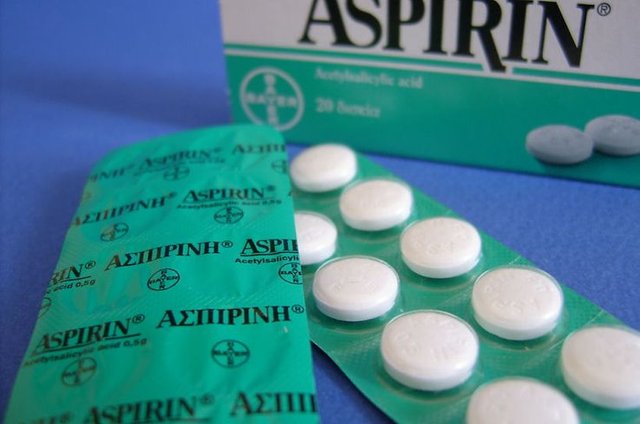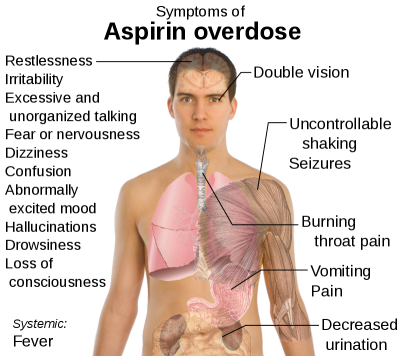Symptoms & First aid---- ASPIRIN POISONING
Aspirin is the popular name of acetylsalicylic acid, a substance primarily used as a painkiller. Ingestion of aspirin and substances with similar properties (salicylates) can lead to poisoning because of an overdose.

Aspirin poisoning can be acute or chronic. In the first case, a single dose ingested was too high and in the second case were administered multiple doses exceeding therapeutic indications in a certain period of time.
Since aspirin concentration required to produce a rapid intoxication is high enough, accidentally overdosing occurs most often. This medical emergency and can occur after applying topical ingestion of acetylsalicylic acid or methyl salicylate.
Severe poisoning with aspirin can have serious consequences, which may lead to death. The first symptoms are nausea, vomiting, hyperventilation, tinnitus (abnormal perception of ringing in the ear), excessive sweating, hyperthermia, fever and double vision. Severe dehydration can also occur. Further symptoms are vertigo, lethargy, confusion, seizures, coma and multiple organ failure. Symptoms of poisoning gradual aspirin may occur within days or weeks after the overdose.
Ingesting more than 150 mg of aspirin per kilogram body can lead to death. Much lower doses of here draw the same result in children.
First aid aspirin poisoning requires following the steps below
- Ensure that the victim suffered poisoning with aspirin.
- Check and monitor the victim's airway, breathing and pulse. If necessary, immediately start cardiopulmonary resuscitation maneuvers.
- Do not induce vomiting if swallowed with salicylates.
- If you find signs of an overdose of aspirin and the victim is unconscious and not breathing shows seizures, emergency call.
- Send emergency crew data refer to your age, weight and condition of the victim, responsible for the poisoning drug name, time of ingestion and the amount is swallowed.
Emergency treatment involves performing gastric lavage with activated charcoal to reduce absorption of aspirin. Baking soda can be administered orally or by infusion to stimulate elimination of the substance in urine. In severe poisoning with aspirin, micturition disorders, using hemodialysis (procedure by which waste products - potassium, urea - are removed from the bloodstream).
Symptoms
The first symptoms of poisoning aspirin are:
- Tinnitus or ringing ears and hearing loss,
- Vomiting,
- Dehydration,
- Fever,
- Tachypnea,
- The feeling of fainting and vision problems.

Classification of symptoms caused by poisoning
Minor symptoms: tachypnea sometimes accompanied by lethargy (pathological state characterized by a deep sleep, lasting through unconsciousness and inability to move), tinnitus, dry mouth and dizziness, vomiting (occurs 3-8 hours after poisoning ) fever.
Moderate symptoms: severe tachypnea, somnolence, observable nervous system, such as lethargy and excitability, but without coma or convulsions.
Severe symptoms: severe tachypnea, coma and sometimes seizures.
When you go to the doctor?
If the patient shows one of the following categories of symptoms, he had to go to hospital.
- Agitation, fever, seizures, confusion, coma, collapse (peripheral circulatory failure, manifested by weakness, sudden drop in blood pressure, arrhythmia);
- Hypotension;
- Tachypnea;
- Tachycardia;
- Heavy bleeding;
- Hallucinations (see, hear or feel things that are not there);
- Severe sleepiness;
- Convulsions;
- Nervousness (severe);
- Visual disturbances;
- Tinnitus (continuous);
- Headache (severe or continuing);
- Nausea and vomiting (severe or continuing).
Prevention
1. The drugs will be administered only to the physician or pharmacist.
2. Never patient is not treated "by ear".
3. To protect children from accidental drug administration, they shall be stored in containers with lid, in a dark closet.
4. Take suicide threats seriously!
5. Always, the doctor must be notified about the side effects or adverse reactions occurring during drug treatment.
6. it never has given another dose than recommended by your doctor.
7. Tell your doctor about all the medicines you take, whether prescription or not.
 )
)
Bibliography
John Fulga - Pharmacology
Valentin Stroescu- Pharmacological Basis of medical practice
NEVER give Aspirin or other NSAID's to a child, Non Steroidal Anti Inflammatory Drugs are EXTREMELY dangerous to anyone who is not into their teenage years ! ! !
Please upvote this, ASPIRIN will seriously injure kids; guaranteed . . .
Upvoted!